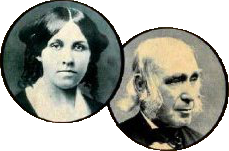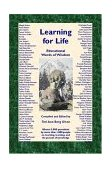

 Louisa May Alcott and Amos Bronson Alcott The lives of Louisa May Alcott and her father were so intertwined that it’s difficult to write about one without considering the other. Although they had very different personalities, they also exhibited amazing similarities. They were each born on November 29th (he in 1799 and she in 1832); both were highly learned without any formal schooling; they found literary success at the same time; and both were greatly influenced by John Bunyan’s classic, The Pilgrim’s Progress. Like father, like daughter, in many respects. But while Mr. Alcott was a utopian dreamer who lacked common sense, Louise was strong-willed and practical. He aimed for self-denial and frugality, while she wished for wealth and fame. Mr. Alcott may have been a “failure” in terms of supporting his family, but Louisa saved them from financial ruin. Yet Louisa honored her father’s steadfast principles and always sought her father’s approval. After he died on March 4, 1888, she died just two days later. Amos Bronson Alcott was born on November 29, 1799. He was raised on a flax farm in Wolcott, Connecticut. Amos had no formal schooling, which was typical of rural Americans at that time. As a child, Amos taught himself to read and write by drawing letters in charcoal on a wooden floor. He grew to be a voracious reader and continued his self-education throughout his life. In his 20’s, tired of working in a clock factory and peddling merchandise as he had done during his teen years, Amos decided to become a teacher since he enjoyed studying and learning. However, Mr. Alcott’s philosophy of education was far ahead of his time. He traveled all over New England and as far away as Virginia in search of teaching posts; but his unconventional ideas made it difficult for him to keep a position. He even tried starting his own schools, and they all eventually failed, in part because of his “radical” educational theories. Ironically, while Mr. Alcott’s progressive teaching methods were not appreciated back then, many of his methods are used in schools today. Mr. Alcott advocated a holistic approach to education, emphasizing the emotional and physical as well as the intellectual development of children. He educated boys and girls, black and white, together in the same classroom. Besides the usual school subjects – reading, spelling, arithmetic, and geography – he introduced art, music, nature study, and physical education. He banished corporal punishment and discarded rote memory – both of which were common in his day – and encouraged the natural development of the child’s interest in grammar, arithmetic, and geography. For example, rather than teaching geography by having students memorize places on maps, he would start by letting the students make a map of their own schoolyard. His other educational innovations included the first school library, student government, and classroom decorations. Mr. Alcott’s central concern was teaching children how to learn. His educational philosophy was based on Socrates’ conversational technique, with the goal of inspiring students to think and “to awaken the soul” to the basic truths which he thought lay in the recesses of every child’s mind. He believed that all children were created equal in the kingdom of God and thus needed to be valued and nurtured, not ignored or suppressed. Mr. Alcott was of the opinion that every child is born with an innate genius, and that the teacher’s role is to help unfold it. Mr. Alcott encouraged children to ask questions, facilitating this process through dialogue between teacher and student. Unlike other educators at the time, Mr. Alcott read and discussed poems and stories with the children, often centered on the meaning of words. He had conversations with his pupils about moral and spiritual topics, and about the life of Jesus. Louisa May Alcott was born on her father’s 33rd birthday while he was working as a teacher in Pennsylvania, but she lived most of her life in Massachusetts. Their home in Concord was a stop on the Underground Railroad. The two-acre grounds contained an orchard of forty apple trees, which Mr. Alcott considered to be the most perfect food. The famous writers Ralph Waldo Emerson, Henry David Thoreau, and Nathaniel Hawthorne were the Alcotts’ neighbors and friends. While the majority of Louisa’s education was obtained from her father, she and her sisters grew up in an intellectual environment in which their days were enlightened by visits to Emerson’s library, nature lessons with Thoreau, and theatricals in Hawthorne’s barn. Mr. Alcott believed that home and family were the keys to social reform and spiritual growth. He eschewed the confines of organized religion though he did believe in God; and like his fellow New England Transcendentalists, he believed that one could come closer to God through nature. As such, he stressed the organic growth of children and their close relation to the natural world. Mr. Alcott instilled the values of self-reliance, self-sacrifice, charity, and a sense of duty in his children. He established an aesthetic environment conducive to learning and stimulating to the imagination. He encouraged his daughters’ individual talents and promoted self-expression by having them keep journals which they openly shared with each other. Louisa wrote, “My father taught in the wise way which unfolds what lies in the child’s nature, as a flower blooms, rather than crammed it, like a Strasbourg goose, with more than it could digest.” Louisa was an imaginative tomboy who loved to run and climb trees, but she also had a love and dedication to writing, acting, and education. When Louisa was only 15, she began helping to support the family by working as an occasional teacher, governess, seamstress, and domestic helper. During the day, while she was sewing or taking care of children, she planned stories. Then at night she wrote them down. Louisa’s first book was a collection of fairy tales. Her most famous work was the beloved classic, Little Women, one of the most popular books ever written for girls. Little Women tells the story of four sisters in a New England family during the Civil War, and it was loosely based on her own childhood. Louisa’s mother, Abigail May, was the beloved “Marmee” of Little Women. Louisa’s father was the model for Mr. March in the novel. Louisa herself was the tomboy “Jo,” and her real-life sisters (May, Elizabeth, and Anna) were the other March sisters (Meg, Beth, and Amy). Her experiences as a traveling companion to a rich young lady inspired the character of Laurie in Little Women. After writing Little Women, Louisa wrote Little Men, Good Wives, An Old-Fashioned Girl, Eight Cousins, Under the Lilacs, Rose in Bloom, and Jo’s Boys (a sequel to Little Women). Louisa also edited a magazine for children, wrote poetry, and authored several Gothic thrillers for adults under the pseudonym “A. M. Barnard.” In her spare time, Louisa served in the women’s suffrage and temperance movements. She gave up a married life to care for her ailing parents and her sister May’s orphan child. During the Civil War, Louisa volunteered as a nurse in a Union Army hospital. While there, she became seriously ill with typhoid fever. The mercury used in her recovery would ruin Louisa’s health which may have led to her early death. In her last days Louisa visited her father’s bedside, knowing that 89-year-old Amos was near death and wanting to see him one more time. “Father,” she said, “Here is your Louy. What are you thinking of as you lie there so happily?” Mr. Alcott pointed toward Heaven and answered, “I am going up. Come with me.” She said, “Oh, I wish I could.” Two days later, she passed away unexpectedly at age 55. Historians debate on whether Louisa died of spinal meningitis, mercury poisoning, lupus, complications from a cold, or “nervous prostration.” Father and daughter are buried in Sleepy Hollow Cemetery alongside Louisa’s mother and sister. Nearby are the final resting places of Henry David Thoreau, Ralph Waldo Emerson, and Nathaniel Hawthorne. Quotations “One must be a wise reader to quote wisely and well.” ~Amos Bronson Alcott “You have a good many little gifts and virtues, but there is no need of parading them, for conceit spoils the finest genius. There is not much danger that real talent or goodness will be overlooked long, and the great charm of all power is modesty.” ~Louisa May Alcott “Where there is a mother in the home, matters go well.” ~Amos Bronson Alcott “Have regular hours for work and play; make each day both useful and pleasant, and prove that you understand the worth of time by employing it well. Then youth will be delightful, old age will bring few regrets, and life will become a beautiful success.” ~Louisa May Alcott “Thought means life, since those who do not think so do not live in any high or real sense. Thinking makes the man.” ~Amos Bronson Alcott “We all have our own life to pursue, our own kind of dream to be weaving, and we all have the power to make wishes come true, as long as we keep believing.” ~Louisa May Alcott “Observation more than books, experience rather than persons, are the prime educators.” ~Amos Bronson Alcott “Far away there in the sunshine are my highest aspirations. I may not reach them, but I can look up and see their beauty, believe in them, and try to follow where they lead.” ~Louisa May Alcott “Our notion of the perfect society embraces the family as its center and ornament, and this paradise is not secure until children appear to animate and complete the picture.” ~Amos Bronson Alcott References http://www.alcott.net - Amos Bronson Alcott Network. http://www.louisamayalcott.org – The Alcotts’ Orchard House in Concord, Massachusetts, where Louisa wrote and set Little Women, is open to the public. http://www.louisamayalcott.org/louisamaytext.html - Louisa May Alcott. http://www.louisamayalcott.org/bronsontext.html - Amos Bronson Alcott. http://www.lkwdpl.org/wihohio/alco-lou.htm - Women in History: Louisa May Alcott. http://www.vcu.edu/engweb/transcendentalism/authors/alcott/ - American Transcendentalism Web: Amos Bronson Alcott. http://www.womenwriters.net/domesticgoddess/lma.htm - Louisa May Alcott: original Master’s Thesis by Kim Wells. http://www.alcottfilm.com - The Woman Behind Little Women; includes lesson plans. http://www.massbook.org/reading_guides/EdensOutcasts_guide.pdf - PDF Study Guide for Eden’s Outcasts.
Eden's Outcasts: The Story of Louisa May Alcott and Her Father
Contact: . Thanks! Please click here for reprint permission.


These pages are a continuous work in progress.
|
Help Support this Site
and purchase items via our affiliate links. Thank you!
 
Thank you for visiting my |

